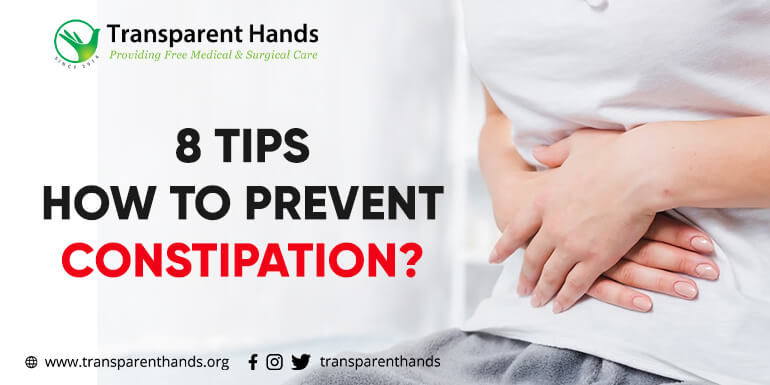8 Tips: How to Prevent Constipation

So, is there a way around this problem? Fortunately, some tips and tricks can help you how to prevent constipation. In this article, we first briefly describe the types, symptoms, and causes of constipation. Then, we share these tips and tricks on how to prevent constipation.
Types
The three types of constipation that are described in the literature are as follows:
- Normal-transit constipation: It is the most common type of constipation. Reasons leading up to this type of constipation are muscular and nervous, which affect a person’s bowel movements.
- Slow-transit constipation: This type of constipation is caused by issues arising in the intestinal food movement pathway.
- Pelvic-floor dysfunction: This type of constipation happens when the anal and rectal muscles are either too weak or too tight. Having regular bowel movements becomes a tough task to achieve when a person is facing pelvic-floor dysfunction.
How to Prevent Constipation?
This comes as a surprise to many, but some tips and tricks can help you prevent constipation.
Fibrous Foods Work
High-fiber foods are your first weapon of defense against constipation. There are plenty of options for your consideration if you are thinking of adding high-fiber foods to your diet. These options include fruits, beans, vegetables, bran, and cereals.
Say No to Processed Foods
Processed foods are low in fiber, your number one hack for preventing constipation. Similarly, it is best to abstain from dairy and meat products as they are also low in fiber.
Level Up Your Fluid Intake!
Sometimes, fluid imbalance can also lead to constipation. Therefore, you can try to avoid constipation by drinking plenty of water, juices, and other fluids that replenish your electrolytes.
Be Active
A lazy lifestyle often gives birth to numerous problems and constipation is one of them. Trying to stay as active as you can and exercising regularly is yet another fine answer to the question of how to prevent constipation.
Master Stress Management
It also has a direct link with stress management. If you are nervous, anxious, or tense all the time because of any reason, chances are high that your metabolic and excretory systems will be disturbed. Constipation can be one of the outcomes of this. So, to cancel out this factor, one can try stress management techniques and see if they improve the situation.
Don’t Say No When Yes Is the Answer!
Holding on is not the best course of action when you feel the urge to pass stool. The natural physiological processes must go on in our body and excretion is one such process. Tinkering with its timing can lead to conditions like constipation.
Scheduling Helps!
Another answer is that you can try creating a regular schedule for your bowel movements. When bowel movements are irregularly scheduled, constipation can be one of the results.
Do the Same for Kids
This works well for the kids as well. The most important of these tips is perhaps the one about fibrous foods. If you can increase the fiber content in their diet while not overdoing things, you have done a great job.
Symptoms of Constipation
Now, let us talk about the signs and symptoms of constipation. Please note that these signs and symptoms are predominantly descriptive of chronic constipation.
- When a person cannot pass stools more than thrice a week, it is a clear sign of constipation.
- Often, the physical appearance of stools can tell a lot about constipation. Hard or lumpy stools are indicative of constipation.
- If you have to strain to have bowel movements, it is a sign you suffer from constipation.
- Constipation is all about blockages. When one can feel this blockage in the rectum, constipation is a possible explanation.
- The inability to empty stool from the rectum is, of course, another clear sign that you are suffering from constipation.
Causes of Constipation
Now, let us talk about the causes of constipation. Anal fissures, bowel obstruction, colon cancer, bowel stricture, and rectal cancer are some of the possible reasons behind colon or rectum blockages. These blockages are one of the main reasons behind constipation. Autonomic neuropathy, multiple sclerosis, Parkinson’s disease, spinal cord injury, and stroke are some neurological problems affecting the colon and rectum that can lead to constipation.
Conditions that affect hormonal balance in our body can also be a causative factor for constipation. These conditions include diabetes, hyperparathyroidism, pregnancy, and hypothyroidism. Pelvic muscles are an important topic in this discussion since problems with their lead to issues in bowel movements. Some of these problems include the weakening of pelvic muscles, lack of coordination between muscles, and the overall inability of muscles to allow for a bowel movement.
Usually, women get constipation during and after their pregnancy due to poor diet, lack of liquid intake, and hormonal changes. It is the most common part of pregnancy which makes this phase worse and unpleasant for many women. They must know all about maternal health by reading about it or through consultation with experts to stay healthy during and after pregnancy.
Constipation can be a tricky condition to deal with. However, if you have taken notes while reading this article, you can counter this problem easily.
(The information in this article should not be taken as a substitute for professional medical advice.)










Leave a Reply